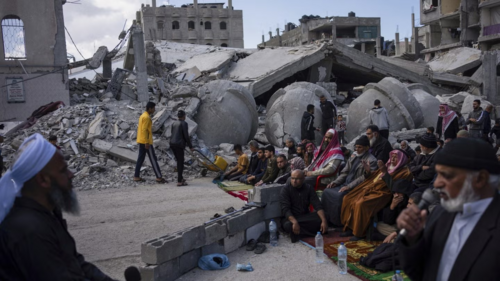How Could Ramadan Affect the Israel-Hamas War?

In Israel and the Palestinian territories – and other parts of the world suffering from conflict – the holy month has often correlated with heightened tensions and violence.
In short: A cease-fire in the Israel-Hamas war was not reached before Ramadan, the Islamic holy month, after weeks of negotiations. U.S. officials had said they were hopeful that a Ramadan cease-fire could be a period of “calm” that allowed humanitarian workers to safely access the Gaza Strip, which has been ravaged by Israeli bombings. In Israel and the Palestinian territories – and other parts of the world suffering from conflict – the holy month has often correlated with heightened tensions and violence.
Why Were There Efforts to Get a Cease-fire Before Ramadan?
Ramadan had become an unofficial deadline for U.S., Qatari, and Egyptian negotiators to broker a deal between Israel and Hamas due to the escalating scale of the conflict. Majed al-Ansari, a foreign policy adviser to the Qatari prime minister, said during negotiations that he feared the conflict could reach “the point of no return” if an agreement was not made before the holy month.
The Biden administration had expressed similar concerns and, accordingly, had harbored significant hopes for what a fighting-free Ramadan could have held. In a press briefing on Mar. 2, one White House official said that they hoped Ramadan could be a period of “calm” where there was the ability “to do the essential humanitarian work.”
The humanitarian crisis in Gaza is rapidly worsening. Since Oct. 7, an estimated 75% of Gaza’s population has been displaced and over half of Gaza’s buildings have been destroyed by Israeli bombs. Israel has also severely limited the amount of food, water, and medicine allowed to enter the strip – which, in northern Gaza, has left one in six children under two years old acutely malnourished.
“Humanitarian aid agencies like UNICEF must be enabled to reverse the humanitarian crisis, prevent a famine, and save children’s lives,” said Adele Khodr, UNICEF Regional Director for the Middle East and North Africa, in a statement.
Amid this crisis, there was also an “emotional goal for Muslims” to have a cease-fire by Ramadan, according to The Washington Post, because it is Islam’s most sacred month.
While Muslims around the world celebrate the holiday in their homes, displaced Palestinians in Gaza are now celebrating Ramadan in tent camps. An Al Jazeera video report shows that these celebrations are very different from how the holiday is usually marked. For example, children typically light fireworks to celebrate the holy month, but they can’t do so in the tent camps for fear of starting a fire.
Letting the conflict rage during Ramadan "adds a layer of distastefulness and outrage to an already pretty horrendous situation,” Khaled Elgindy, director of the Middle East Institute’s program on Palestine, told Foreign Policy. “It adds more pressure on Arab governments to at least look like they’re doing something.”
How has Ramadan Affected Israel and the Palestinian Territories in the Past?
Ramadan has often correlated with increased tensions in Israel and the Palestinian territories. One specific point of tension is the Al-Aqsa Mosque in East Jerusalem, which holds religious significance both for Muslims and for Jewish people, who know the site as the Temple Mount.
During Ramadan, many Muslims visit the mosque, which is considered one of Islam’s holiest sites. But, in the past, Israel has restricted how many Palestinians can visit the mosque during the holy month and has conducted police raids on the site. Israeli police raids and settler provocation at Al-Aqsa were one reason Hamas listed when explaining its motivations for the group’s Oct. 7 attack that killed about 1,200 Israelis and took more than 200 hostages.
Ahead of this year’s Ramadan, Israeli Prime Minister Benjamin Netanyahu rejected a far-right plan to restrict access to the mosque even further than what was typical in past years — but he also said that access to the mosque will be evaluated on a weekly basis.
Two of Israel’s past military operations in Gaza also started during Ramadan – Operation Protective Edge in 2014 and a 2021 conflict that erupted after Israeli police stormed Al-Aqsa Mosque.
How has Ramadan Affected Conflict in Other Parts of the World?
The jihadist terror group the Islamic State (also known as ISIS or ISIL) often ramps up violent attacks during the holy month.
Iraq and Syria, where the group conducts most of its operations, have been hit particularly hard by these Ramadan attacks over the years. In 2023, for instance, the Islamic State carried out fewer attacks during Ramadan than it had in years — but it still carried out 19 attacks each in Syria and Iraq.
Conflicts far outside the Middle East can also affect the region’s ability to celebrate Ramadan in typical fashion. Syria, for instance, imports large volumes of wheat and other food products from Ukraine. In 2022, the Ukraine war increased the price of these imports, exacerbating an ongoing economic crisis in Syria and making the food many Syrian Muslims would buy to break the Ramadan fast unaffordable.
In Sudan, meanwhile, fighting between the Sudanese Army and the Rapid Support Forces has been ongoing for nearly a year, worsening the “world’s largest displacement crisis” and creating the potential for “the world’s worst hunger crisis,” according to the United Nations. The ongoing violence is likely to disrupt celebrations of the holy month for the majority-Muslim population of Sudan – which, as in the Israel-Hamas war, has led to calls for a Ramadan cease-fire.
Last week, U.N. Secretary-General António Guterres appealed to both sides of the Sudanese conflict to cease fighting during Ramadan, saying, “A Ramadan cessation of hostilities can help stem the suffering and usher the way to sustainable peace.”

